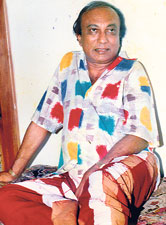Tissa Abeysekara, award winning script writer, filmmaker, actor, critic, academic and administrator who bid farewell to the nation last Wednesday is an irreplaceable loss to the country’s cinema and literature.
Starting his artistic career while still a schoolboy, Tissa wrote short stories to the newspapers in the 1950s and his biggest turning point came when he met renowned filmmaker Dr. Lester James Peries who lured him into cinema.
Later Tissa assisted Lester in his internationally acclaimed masterpiece ‘Gamperaliya’ writing its dialogues and later turned out to become one of the finest screenplay writers of the country. Among the long list of screenplays he wrote are ‘Welikathara’, ‘Akkara Paha’, ‘Nidhanaya’, ‘Kalu Diya Dahara’, ‘Weera Puran Appu’, ‘Ganga Addara’, ‘Ahasin Polowata’, ‘Podi Malli’, ‘Karumakkarayo’, ‘Mahagedara’, ‘Viragaya’, ‘Kulageya’, ‘Guru Gedara’, ‘Loku Duwa’, ‘Binaramalee’, ‘Weeduru Gewal’, ‘Maya’ and ‘Kawuluwa’.
Interestingly four of the best ten Sinhala films ever made ‘Gamperaliya’, Nidhanaya, ‘Welikathara’ and ‘Viragaya’ were made with the contribution of Tissa as a director or script writer.
Having joined the Government Film Unit as a documentary filmmaker, he made over forty documentaries before breaking through as a feature filmmaker with ‘Karumakkarayo’ based on Dr. Gunadasa Amarasekara’s controversial novel. This was followed by ‘Mahagedara’ and then the highly successful ‘Viragaya’ based on Martin Wickramasinghe’s greatest novel, which was considered unfilmable. Even today ‘Viragaya’ is considered one of the finest Sinhala films ever made.
As a strong administrator Tissa headed the National Film Corporation and also served on the Boards of the Sri Lanka Rupavahini Corporation, the Aesthetic Institute of Sri Lanka, affiliated to the University of Kelaniya, a Council Member of the University of Visual and Performing Arts, Colombo and Trustee of the National Heritage Trust of Sri Lanka and headed the Sri Lanka Television Training Institute as his final assignment.
Heading the SLTTI, Tissa worked hard to educate and breed a generation of young filmmakers to the country. He was a ready teacher to share his knowledge before a film screening or a discussion on the film screened at the SLTTI or any other film festivals.
I could still remember how Tissa Abeysekara gave a lecture on the ‘French New Wave cinema’ at a workshop held at the SLTTI, nearly two years ago and how he eloquently described the genre of cinema and its pioneers François Truffaut, Jean-Luc Godard, Éric Rohmer, Claude Chabrol, and Jacques Rivette who began as film critics for the famous film magazine ‘Cahiers du cinéma’.
There Tissa who himself is a film critic describes what an important role a film critic could play in changing a country’s cinema for the better.
Supremely bilingual; communicating in both Sinhala his mother tongue and English which he calls his surrogate mother tongue, Tissa was a bridge between the literatures of two languages.
For his excellent way of handling the language, Tissa was awarded with the prestigious Gratiaen Prize for the best piece of Creative Writing in English in the year 1996 for a novel ‘Bringing Tony Home’. Other creative literary works of Tissa include ‘Ayale Giya Sithaka Satahan’ (Essays), ‘Rupa-Svarupa’ (Essay on film) and ‘Cinema Sithuvili’ (Art of film).
Having triumphed in cinema and literature, Tissa also contributed to the small screen directing award winning teledramas like ‘Dolos Mahe Gangawa’, ‘Wana Sarana’ and ‘Pitagamkarayo’.
He was even called upon to make a film called ‘Soorya Muki’ for the Nepalese government.
As an actor he proved his prowess in films like ‘Delowak Athara’, ‘Baduth Ekka Horu’, ‘Veera Puran Appu’, ‘Maha Gedara’, ‘Parasathuro’, ‘Wathsala Akka’ and ‘Ammawarune’.
Tissa’s death is not only a loss to the present Sri Lankan cinema but also to a number of future generations who were waiting without a proper school to learn this art. |

